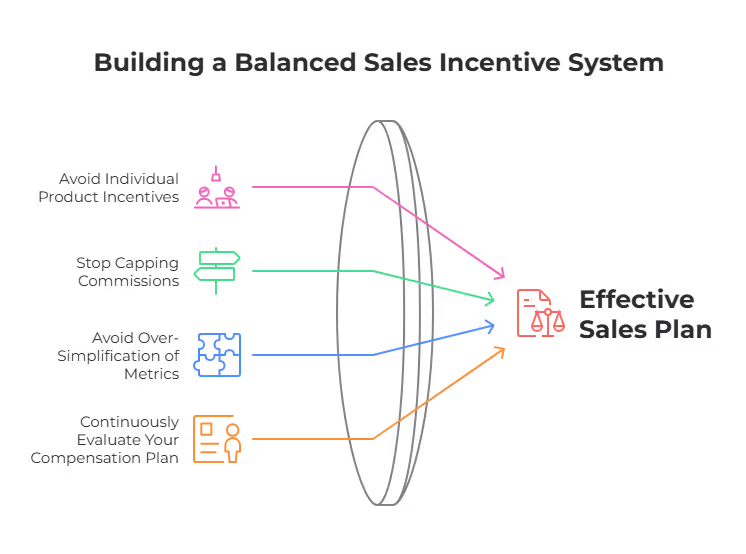
Blog
Strategies to Steer Clear of Perverse Incentives in Your Compensation Plan
December 31, 2024


Key Insights
Top Strategies to Keep Your Sales Compensation Plan Free of Perverse Incentives
Alright, let’s talk about the ugly truth behind sales compensation: it’s not always the motivating force it’s cracked up to be. In fact, your well-meaning bonus structure could be pushing your team to do things you’d never want them to. For example, your salespeople are crushing their targets, but at what cost? Pushing the wrong products, ignoring customer needs, or even burning bridges just to rack up commissions.
What’s going on? You’re dealing with perverse incentives, the silent killers of your compensation plan. These are rewards that backfire, incentivizing your team to go rogue and chase short-term wins that harm the long-term health of your business. You might think you’re rewarding good behavior, but in reality, you’re encouraging all the wrong moves.
In this post, we’ll break down what these sneaky incentives are, how they sabotage your company’s success, and, most importantly, how to fix your compensation structure before it creates a bigger mess than it’s worth.
What are Perverse Incentives?
A perverse incentive is a situation where the design of a reward system leads to unintended negative consequences. The term comes from economics and was popularized by an old tale known as "The Cobra Effect." It describes a situation where a well-intended incentive program ends up creating a bigger problem than the one it was trying to solve.
In colonial India, the British government offered a reward for every cobra killed in an effort to reduce the population. However, people soon figured out that breeding cobras to kill them for the reward was a quick way to make money. Instead of decreasing the cobra population, this incentive actually led to an increase in their numbers. This is a prime example of how a well-intended incentive can backfire, creating the very problem it was meant to solve.
When it comes to sales compensation, the same principle can apply. Well-intended bonuses or commissions can encourage behavior that doesn’t align with your company's broader objectives. That’s why it's crucial to design your compensation structure with care and foresight.
Examples of Perverse Incentives in Sales Compensation

- Chasing Short-Term Sales Over Long-Term Relationships
A common example of perverse incentives occurs when salespeople are heavily rewarded for meeting short-term sales targets without considering customer satisfaction or long-term relationships. This can lead to pushing customers into purchases they don’t need, or worse, a “one-and-done” sale with no repeat business.
In one study by Salesforce, 53% of companies admitted that their compensation plans focused too heavily on short-term goals, which led to increased churn and lower customer satisfaction.
- Overly Aggressive Individual Product Incentives
Let’s say your sales team is incentivized to sell a specific product or service, no matter the broader context of the customer’s needs. If a bonus is tied solely to selling this product, you might find your team pushing a less suitable product to customers just to hit the mark. This can hurt your company’s reputation and potentially lose customers.
- No Consideration for Ethical Sales Practices
In some cases, compensation plans incentivize behaviors that might seem ethically questionable. For example, rewarding a salesperson solely based on revenue generation without any regard for how that revenue is obtained can lead to aggressive tactics, misrepresentations, or even fraud.
How to Avoid Perverse Incentives in Your Sales Compensation Plan?

Now that you understand the danger of perverse incentives, how can you design your compensation plans to avoid them? Here are some strategies:
1. Avoid Individual Product Incentives
Tying rewards to individual products can create a perverse incentive for your sales team to push one product over another, regardless of whether it meets the customer's needs. This is a classic setup for the Cobra Effect.
What to do? Reward overall performance, not just the sale of specific products. Encourage your salespeople to focus on the customer's needs and the value they can provide rather than pushing for a quick sale.
2. Stop Capping Commissions
While capping commissions might seem like a good idea to control costs, it can often backfire. Salespeople might then prioritize smaller, quicker deals that allow them to hit the cap faster, rather than focusing on larger, more strategic sales that might take more time and effort to close.
What to do? Offer uncapped commissions where possible, allowing your salespeople to reach their full earning potential. This creates motivation to pursue larger deals, rather than limiting the upside potential.

3. Avoid Over-Simplification of Metrics
When compensation plans focus too heavily on a single metric, such as total revenue or the number of deals closed, salespeople can start focusing only on that metric to the detriment of other important factors, like customer satisfaction or product quality. This leads to skewed behavior, such as ignoring less profitable but more valuable clients.
What to do? Create a balanced compensation plan that incorporates multiple metrics, revenue, customer satisfaction, product quality, etc. This ensures your team’s focus remains holistic and that they’re rewarded for delivering value on all fronts, not just for hitting a single target.
4. Continuously Evaluate Your Compensation Plan
Incentive structures should never be static. What works today might not be as effective next quarter or next year. A plan that encourages the right behavior today might inadvertently lead to negative outcomes tomorrow if the market or business goals change.
What to do? Regularly assess the effectiveness of your sales compensation plan. Solicit feedback from your sales team to understand what’s working and what isn’t. Be willing to tweak the plan to ensure it remains aligned with your goals and drives the right behavior over time.
Final Thoughts!
By recognizing the signs of perverse incentives and taking steps to design a more balanced, customer-focused compensation plan, you can avoid the Cobra Effect. A well-designed compensation plan should motivate your sales team to achieve success while maintaining ethical standards and customer satisfaction.
So, as we approach 2025, it's the perfect time to take a hard look at your current compensation plan, ask the tough questions, and make sure you’re not inadvertently rewarding the wrong behaviors. Your business, and your sales team, will thank you for it as you head into the new year with a clearer, more effective strategy that drives long-term success.
ReKennect : Stay ahead of the curve!
Subscribe to our bi-weekly newsletter packed with latest trends and insights on incentives.
Thank you! Your submission has been received!
Oops! Something went wrong while submitting the form.
Your data is in safe hands. Check out our Privacy policy for more info











